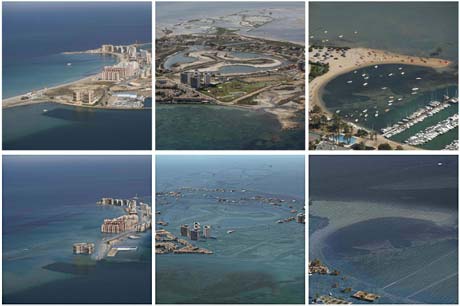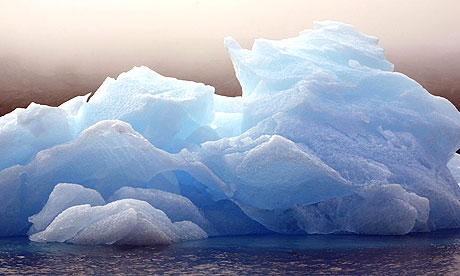| By James Painter
BBC News, southern Greenland |

Top scientist Professor Minik Rosing was stunned to hear the news from his native Greenland a few days ago.
The main weekly newspaper, Sermitsiaq, was highlighting a quarrel between shop owners and farmers about the price of potatoes.
"The price of potatoes was a headline," says Professor Rosing. "That would have been a hilarious joke in Greenland a few years ago."
Professor Rosing is one of his country's most famous sons, after discovering the earliest traces of life in rocks in West Greenland, that are more than 3,800 million years old. Like his fellow countrymen, he is deeply concerned about global warming, and particularly the effects of rapidly melting ice on the traditional life of hunters in the north of the country.
But higher temperatures are also bringing some benefits to the sub-Arctic south part of the island.
"I could buy broccoli in the shops for the first time this year," says Buuti Pedersen, a 52-year-old artist who was born and lives in the southern town of Qaqortoq. "And the potatoes are big, fresh and tasty - much better than the ones that come from Denmark."
Pace of change
Potatoes have been grown in southern Greenland for several years, but because of global warming they can be planted earlier, which means better yields. Local farmers are now selling a surplus to the rest of the country.
"There's been an explosion of potatoes," says Lene Holm, a member of the Inuit Circumpolar Council, which is overseeing a project studying how climate change is affecting local communities.
"There are also many more flowers, like the Alaska Lupin. You can see more green further up the mountains as the glaciers retreat. People are ringing up the national radio station about birds they had never seen here before."
Lene Holm is worried, though, about the sheer pace of the changes, which have happened in the past five to 10 years. Local people, she says, are very confused about the weather. Their perception is that winds are unpredictable; the ocean is warmer and its currents more variable, while the sea ice conditions are changing rapidly.
Ice melt
Preliminary results suggest that Greenland's ice cover has shrunk to a record low this summer. Dr Bob Corell, chairman of the Arctic Climate Impact Assessment, told a symposium of scientists and religious leaders in Greenland, which finished this week, that the acceleration of the Arctic ice melt was now "massive".
Dr Corell has been monitoring one particular glacier near the western town of Ilulissat, which was probably the source of the iceberg which sunk the Titanic. It is now flowing into the sea at a rate of 15 km per year - about four times faster than 10 years ago.
He is predicting that the best bet for the year in which the Arctic will be totally free of summer ice is now 2040, "give or take a decade". Not so long ago, scientists were projecting the end of the century.
The government of Greenland is worried about the human impact of the ice melt.
"There is sea ice for two to three months less every year," says Aleqa Hammond, Minister for Finance and Foreign Affairs. "For the communities in the north who live solely off hunting and fishing, it's like your boss taking away your pay for a couple of months without giving you notice."
Ms Hammond reckons that the number of Greenlanders living only off hunting could have dropped by as much as 6,000 in the past 10 years, from 8,000 to only 2,000 now. That's a significant social change in a country with a population of around 56,000. "I come from a hunting family," she says. "Five of my uncles were hunters. Now only two are."
'Political independence'
While Ms Hammond is very concerned about how quickly northern communities will have to adapt to climate change, she is also optimistic about the positive developments it could bring. She points to the greater volumes of halibut being caught off the west coast due to warmer sea temperatures, and the return of cod to some areas.
In addition to achieving more self-sufficiency in food products, she wants to develop hydroelectric power, oil and gas exploration, and the mining of Greenland's rich mineral deposits. All of this could become technically easier as the ice melts.
Greenland has signed a memorandum of understanding with the US company Alcoa to build a huge aluminium smelter using the country's plentiful water reserves.
"All of this can help us to reduce our economic dependence on Denmark," says Ms Hammond, "and could eventually lead to political independence."
Denmark currently gives about US$600m a year to Greenland, equivalent to about half its budget. Since 1979 Greenland has had home rule, but not full independence.
So will Greenland be a net beneficiary or a loser from climate change? On the one hand, it could lose a proud Inuit heritage of dog sleds and whale hunting, walruses, seals and polar bears. But on the other it may gain economically.
"You are not really comparing like with like," says Professor Rosing. "Loss of cultural identity and economic benefits are two different categories. You can't quantify the loss of our traditions. The real problem is that we are having to adapt so quickly."












